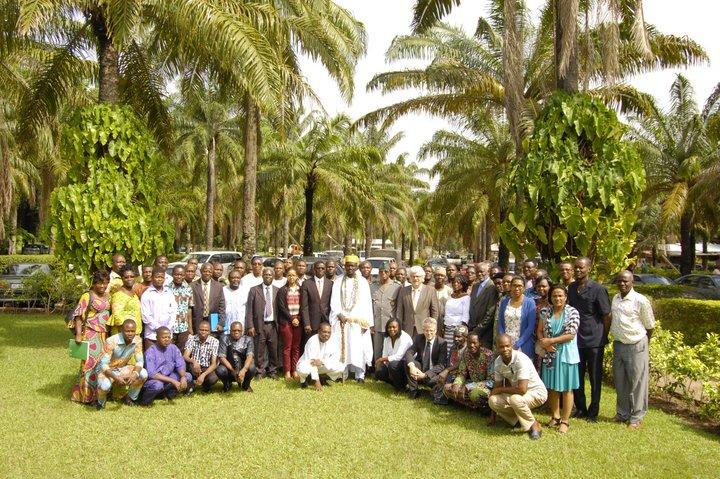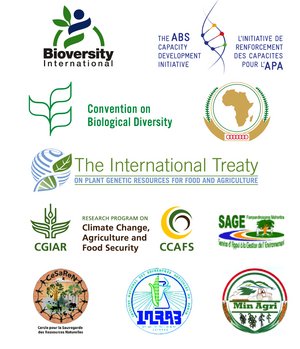Mutually supportive implementation of the Plant Treaty and the Nagoya Protocol in Benin and Madagascar

Bioversity International is working with the Access and Benefit-Sharing (ABS) Capacity Development Initiative, the secretariats of the CBD and ITPGRFA, the African Union Commission, and with partners and stakeholders in Benin and Madagascar, to develop ABS laws and agreements that contribute to pro-poor rural development and offset the cost of conserving genetic resources. This research is conducted with the support of the Darwin Initiative – a UK Government funding programme.
Bioversity International is working with the Access and Benefit-Sharing (ABS) Capacity Development Initiative, the secretariats of the CBD and ITPGRFA, the African Union Commission, and with partners and stakeholders in Benin and Madagascar, to develop ABS laws and agreements that contribute to pro-poor rural development and offset the cost of conserving genetic resources. This research is conducted with the support of the Darwin Initiative – a UK Government funding programme.
Biodiversity is often treated like a global public good – free to exploit without reciprocal obligations to conserve. Consequently, while countries’ interdependence on genetic diversity is increasing due to climate change, population pressure and globalization, local biodiversity stewards often go unnoticed. The Nagoya Protocol and the International Treaty on Plant Genetic Resources for Food and Agriculture (ITPGRFA) create ABS norms to address these situations, to ensure the politico-legal recognition of biodiversity stewards and their rights to benefit from others’ use of their biological resources/traditional knowledge, compensate their conservation efforts, and increase their asset base through access to resources and know-how.
The access to and use of plant genetic resources is vital for farmers all over the world to adapt to climate change and to make their agricultural systems more productive. International agreements, such as the Nagoya Protocol adopted in 2010 by the Conference of the Parties to the Convention on Biological Diversity (CBD), and ITPGRFA aim to guarantee that the benefits arising from the use of genetic resources are shared in a fair and equitable way. The ITGRFA creates a multilateral system (MLS) whereby countries agree to virtually pool and share the plant genetic resources of 64 crops and forages for food and agriculture-related purposes. The CBD and its Nagoya Protocol, on the other hand, tend to favour the negotiation of bilateral ABS agreements between providers and users of genetic resources and traditional knowledge.
Since their ratification, the international community has made enormous investments in the negotiation of the CBD, the ITPGRFA and most recently, the Nagoya Protocol. However, to date there are no examples of these mechanisms being fully implemented in mutually supportive manners.
Madagascar and Benin have both ratified the ITPGRFA and the Nagoya Protocol. However, neither country has mechanisms to implement either agreement separately and hence much less in a mutually supportive manner. To overcome this issue, this project aims to promote the national implementation of the MLS; increase Benin’s and Madagascar’s overall participation in the MLS both as providers and recipients of genetic resources and information, and pursue options to benefit from other aspects of the ITPGRFA, including provisions on access to and transfer of the technology and genetic material which is included under the MLS. Through capacity strengthening, the project seeks to implement the international policy commitments in ways that respond to local realities, contributing to development benefits. This will be achieved by empowering local communities and taking advantage of the incentives and benefits existing in each of the countries available to both the stewards/providers of genetic resources and traditional knowledge, and the recipients of genetic resources and associated information and technologies. We are working with two groups of communities in both Madagascar and Benin seeking to help them to organize information about the biological diversity they manage in local agricultural systems and forests, and developing community biodiversity management plans and ABS protocols.
 One of the cornerstones of the project is that the project activities in each country is guided by a National Project Committee, that is, a multi-agency, multi-stakeholder committee co-chaired by the focal points for each of the ITPGRFA and the Nagoya Protocol (or higher level position or organization as a whole). Additionally, in consultation with this National Project Committees, an Expert Guidance Committee (EGC) is in charge of monitoring project progress and coordinating additional forms of technical assistance. The EGC includes nine members: the two lead national organisations from each country, the ABS Capacity Development Initiative, the secretariats of the CBD and ITPGRFA, the African Union Commission and Bioversity International.
One of the cornerstones of the project is that the project activities in each country is guided by a National Project Committee, that is, a multi-agency, multi-stakeholder committee co-chaired by the focal points for each of the ITPGRFA and the Nagoya Protocol (or higher level position or organization as a whole). Additionally, in consultation with this National Project Committees, an Expert Guidance Committee (EGC) is in charge of monitoring project progress and coordinating additional forms of technical assistance. The EGC includes nine members: the two lead national organisations from each country, the ABS Capacity Development Initiative, the secretariats of the CBD and ITPGRFA, the African Union Commission and Bioversity International.
Read more about the Mutual Implementation of the Plant Treaty and the Nagoya Protocol.
Find a selection of resources and further information below:
In the Media
- La commune de Bonou vers l'élaboration de son registre de biodiversité (August 2016, Benin)
- Highlights about the contribution of the project to 'mainstreaming biodiversity' in the Darwin initiative Newsletter (May, 2016)
- Vers la mise en oeuvre du traité TIRPAA (July 2015, Madagascar)
- Lancement des activités du projet Nagoya (May 2015, Benin)
- Le projet de mise en oeuvre lancé pour sécuriser les ressources génétiques (May 2015, Benin)
Video
- Video: Lancement officiel de la mise en oeuvre du projet Mutuel soutien du Protocole de Nagoya et le Traité international au Benin
- Video recorded by the CBD for the official launch of the project in Madagascar
Project's main products
- Developed in Year 1 (April 2015 - March 2016)
- Developed in Year 2 (April 2016 - March 2017)
- Developed in Year 3 (April 2017 - present)
Links to other project activities developed under the scope of this research
- The project sponsors awareness raising and capacity strengthening workshops at the community level in Bonu and Tori Bosito (Benin), 9 - 10 and 23 - 24 of August 2016, respectively
- The project sponsors awareness raising and capacity strengtheningworkshops at the community level in Madagascar, 25 - 30 July, 2016
- National partners share the main products developed during the project's first year. Addis Ababa, Ethiopia, 18 – 21 April, 2016
- Partners from Benin and Madagascar attend the training course Resilient Seed Systems and Adaptation to Climate Change, Benin, 15 - 18 December, 2015
- The project sponsors a national workshop for raising awareness on the International Treaty on Plant Genetic Resources for Food and Agriculture, in Benin, 1, 3, 7 December, 2015
- The project sponsors a national workshop for raising awareness on the International Treaty on Plant Genetic Resources for Food and Agriculture in Madagascar, 25 - 26 November, 2015
- Partners from Benin and Madagascar participate in the workshop Embedding mutually supportive implementation of the Plant Treaty and the Nagoya Protocol in the context of broader national policy goals. Addis Ababa, Ethiopia, 16 - 20 November, 2015
- Partners organize a side event during the Sixth Session of the Governing Body of the ITPGRFA. FAO, Rome, Italy, 5 - 9 October, 2015
- Official launch of the project in Madagascar, 14 - 16 July, 2015
- Partners from Benin and Madagascar attend the workshop Strengthening National capacities to implement the International Treaty: National-level multilateral system policy development. Bioversity International, Rome, Italy, 23 - 26 June, 2015
- Official launch of the project in Benin,13 - 15 May, 2015
Partners

This project is conducted with the support of the Darwin Initiative - a UK Government Funded Programme.
It is carried out in collaboration with the ABS Capacity Development Initiative,the Secretariats of the Convention on Biological Diversity and the International Treaty on Plant Genetic Resources for Food and Agriculture and the African Union Commission.
It is delivered through the CGIAR Research Programme on Climate Change, Agriculture and Food Security and through Bioversity International's Effective Genetic Resources Conservation and Use Initiative.
- Photo: Participants to the official launch of the project Mutually supportive implementation of the Nagoya Protocol and the International Treaty in Benin, May 2015 Credit: Wilfried Anagonou
